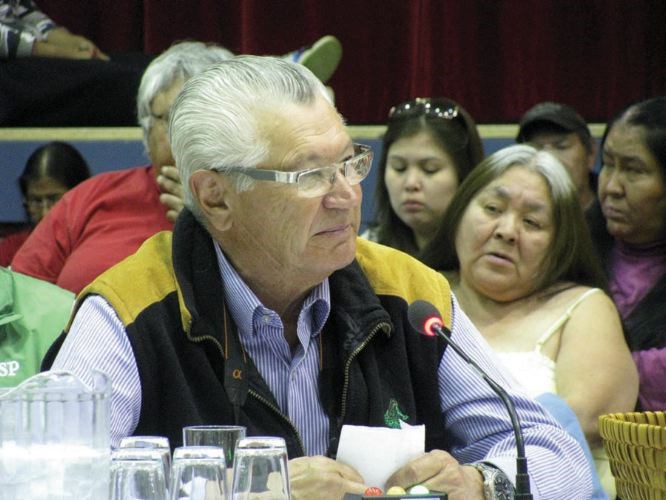One by one, the survivors of residential schools spoke into a microphone on Monday in Prince George and gave a glimpse of their lifelong pain and trauma.
The microphone was brought to Prince George by the Truth and Reconciliation Commission of Canada on their nationwide tour, collecting the thoughts and remembrances of aboriginal people who were taken from their homes and forced to attend residential schools, where they were encouraged to forget their language and their culture.
The Honorable Justice Murray Sinclair, the chair of the commission, called the 150-year period of residential schools a destabilizing force for First Nations.
"We are creating a national memory," he said, in the gathering of the survivors' stories. "Like with any holocaust event, we don't want to allow future people to deny these things occurred."
All testimony gathered by this process will be nationally archived for full public use. The commission was created as part of the negotiated settlement between First Nations and the federal government. The settlement ended further court proceedings, so the process of hearings was established allowing the victims to still speak their experiences into the public record.
The first to do so in Prince George was Charlie Joseph, who started by speaking at length in his native tongue before switching to English. He fought tears as he described how Lejac Residential School brutalized him to the point that he was living on the street in a drug and alcohol stupor until addictions interventions took place.
"How can we reconcile? How can we?," he said. "I wish I could say nice words. But bitter words want to come out. Hatred wants to come out. How many of you could talk about sexual abuse openly? Physical and emotional abuse? Reconciliation: how can we do it?"
He urged all survivors to tell their stories to the commission, no matter how difficult. Private rooms are available as part of the hearing process, to allow testimony without public attention.
"People didn't believe what took place," he said, describing what many victims faced when they initially tried to summon help. "We all know about Fitzgerald. There are still bigots like that around today who prey on innocent children."
Edward Gerald Fitzgerald was made notorious for being the only unarrested suspect of the 14 residential school personnel pursued by RCMP for sexual and extreme physical abuse allegations against the children once in their care. Fitzgerald was charged with 21 counts of assault against 10 boys, all at Lejac (Fraser Lake) and St. Joseph's (Williams Lake) schools. He fled to Ireland in 2002, a country with which Canada has no extradition treaty. He was 78 years old at the time.
Jack Lacerte threw himself headlong into mainstream culture, first by joining the Royal Canadian Air Force, then by becoming one of Canada's first aboriginal members of the RCMP. He spent much of his Mountie career in the B.C. central interior where he grew up.
The physical and emotional abuses he suffered were not the cruelest of Lejac's indignities, however, for him and his family. His father and mother also attended Lejac as children, and his dad was a staff member at the school on one of the most infamous nights of its horrifying history - the night four students decided to make a break for it. They attempted to run away across the ice of Fraser Lake and go back home, but froze to death in the attempt.
"The priest said there would be a big investigation by Indian Affairs, and two priests arrived from Ottawa by train," said Lacerte. He remembered how they came to the Lacerte home and asked to speak to his father. "They said to my father 'this is what we want you to say to Indian Affairs.' My dad and mom were quite strong Catholics and dad outright told them 'what you're asking me to tell them is a lie' and refused. The priests said 'you have 24 hours to get off the property' so he moved us to Fraser Lake."
The unjust expulsion was shameful, but adding to the injury was the priests' next move. They destroyed any record of the Lacerte family working or schooling at Lejac. When the governments of modern times provided financial support for those who had suffered at residential schools, Lacerte could not collect the recompense he was due because there was no sign he was ever there.
Grand chief Ed John of the Assembly of First Nations was another who turned Lejac into a platform for personal success, but he was in attendance in Prince George on day one of the hearings to punctuate that the system was, at the core, an attempt at genocide. John was the first to throw his arms around his old friend Joseph when that tearful testimony came to an end.
"We were just about destroyed," said Joseph. "But we are resilient people. They looked down on us Indians."
But today Joseph is clean, sober, with a restored faith in God.
More testimony is scheduled for today before the hearings move on to other Central Interior locations for further victim testimony.



